The Love Triangle Spread
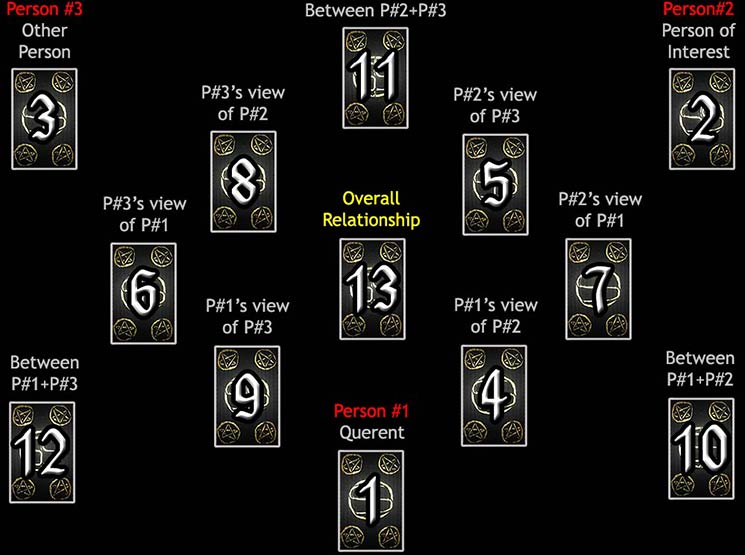
Difficulty: Complicated
Casually referred to as the Love Triangle, this spread can be used to determine the dynamics of the relationship between three people, regardless of whether romance is involved. This spread is arranged in the form of a hexagram, consisting of several large and small triangles. This tarot spread may seem somewhat complicated, but it is not entirely that difficult.
The first step is to interpret the card for each individual position in the spread. Generally, one might ask about a relationship they are involved in, but this does not have to be the case. Ordinarily, the reader's representative card is #1, their main person of interest is #2, and the other person would be #3.
The second step fills in the downward triangle and involves further examination of the individuals through their views of the other people. Each person has two more cards showing the way they see and relate to the other members of the triangle. For example, Card #6 indicates how Person #3 relates to Person #1, while Card #9 stands for Person #1's attitude toward Person #3.
The next step completes the upward triangle and the hexagram, focusing on cards #10–13. It also completes the many smaller triangles and hints at the potential for each relationship. The final card, #13 can be considered the significator of the reading, which suggests the overall potential for this three-way relationship.
Your Love Triangle Reading
| P#3 | 3to2 | 2+3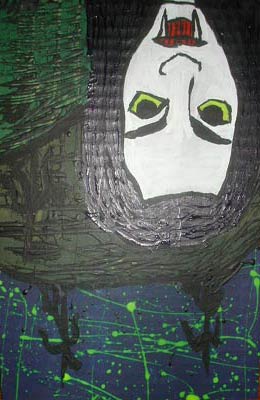 |
2to3 | P#2 | ||
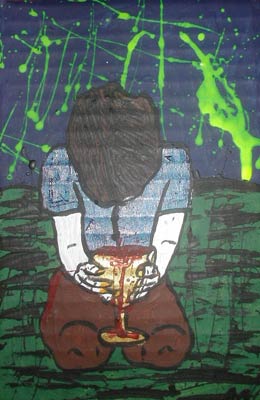 |
3to1 | 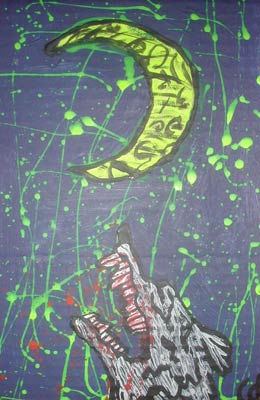 |
Overall |  |
2to1 | 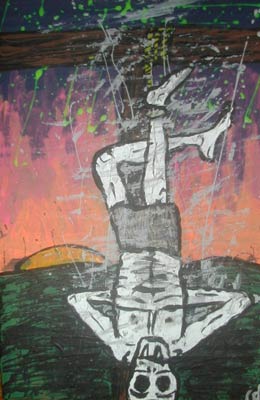 |
| 1+3 | 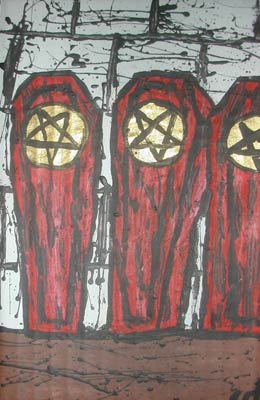 |
1to3 | 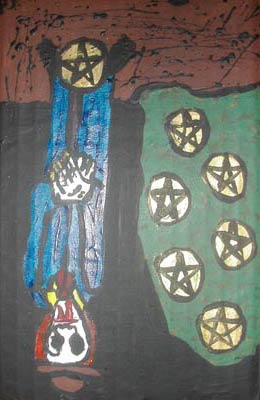 |
1to2 | 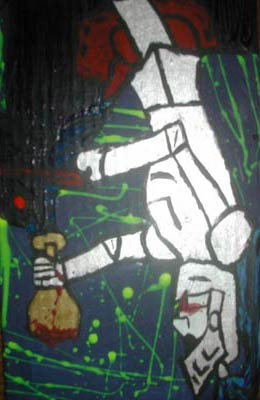 |
1+2 |
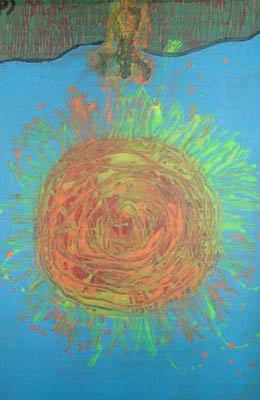 |
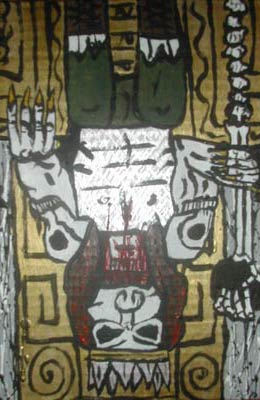 |
P#1 | 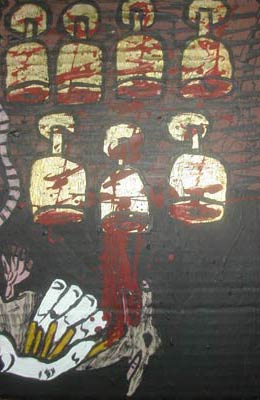 |
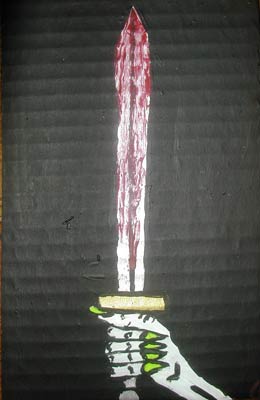 |
||
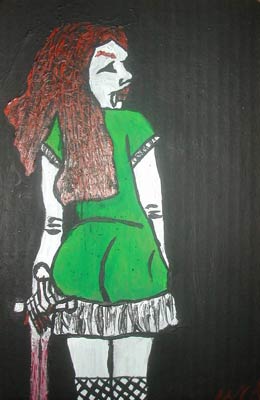 |
1: Person #1

Symbolism:
The Queen of Swords stands tall, her gaze unwavering as she flaunts herself with calculated poise. Her demeanor combines sorrow and sharpness, reflecting wisdom earned through hardship. A single sword rests in her hand, pointed skyward, symbolizing clarity, truth, and intellect. The surrounding environment is barren yet serene, highlighting her emotional resilience and detachment.
Meaning:
The Queen of Swords represents intellect, independence, and clear judgment. She is a figure of sharp wit and decisive action, unafraid to make difficult choices. This card often symbolizes someone who has weathered emotional storms and now relies on logic and fairness to navigate life. It calls for honesty, objectivity, and discernment in your decisions.
Keywords:
Upright: Independence, intellect, clear judgment, fairness, decisiveness, honesty.
2: Person #2

Symbolism:
The Hanged Man is shown suspended upside-down from a barren tree, his foot bound by a chain of silver. His expression is serene, as if willingly surrendering to his predicament. A pool of crimson liquid forms beneath him, reflecting a full moon, symbolizing surrender and the potential for transformation. Surrounding him, shadows twist into shapes of wings, hinting at the freedom that comes through letting go.
Meaning:
The Hanged Man represents surrender, perspective, and the need to pause. It encourages you to let go of control and view a situation from a different angle. This card often signals a period of waiting or self-sacrifice, where stepping back can lead to greater understanding or personal growth.
Keywords:
Upright: Surrender, perspective, pause, letting go, reflection, patience, transformation.
3: Person #3

Symbolism:
A young vampire sits in a prostate position, poised to consume a chalice filled with the most desirable sustenance. The image conveys a sense of eagerness and anticipation, focused on a new emotional journey or experience.
Meaning:
The Page of Cups represents youthful enthusiasm, creativity, and emotional curiosity. It symbolizes the beginning of new emotional experiences, such as love, art, or self-discovery. This card often represents an individual who is open-hearted, sensitive, and in tune with their emotions. It can also indicate a message or invitation related to feelings or creative pursuits.
Keywords:
Upright: Youthful energy, creativity, emotional curiosity, new beginnings, messages, open-heartedness.
4: Person #1's view of #2

Reversed
Symbolism:
An unfortunate vampire has run out of the “good stuff” and must now rely on less desirable means. The card hints at illusions and unattainable desires, emphasizing the fantasy of having everything.
Meaning:
The Seven of Cups is a card of illusions, choices, and confusion. It represents the overwhelming number of options or fantasies that may lead to unrealistic expectations. This card calls for discernment and clarity, urging you to focus on what truly matters rather than being distracted by distractions or fleeting desires.
Reversed, it signals a clearing of confusion, making important decisions, and taking practical steps toward goals. It can also represent clarity after a period of uncertainty.
Keywords:
Reversed: Clarity, decision-making, focus, discernment, realistic goals.
5: Person #2's view of #3

Symbolism:
The King of Stakes sits confidently in his domain, surrounded by the grim trophies of his reign. His impaled victims act as a wall of protection, symbolizing his authority, control, and the cost of maintaining power.
Meaning:
The King of Stakes represents authority, leadership, and honesty. He encourages you to act with integrity and take responsibility for your decisions. This card often signals success, stability, or the arrival of significant news, particularly regarding inheritance or financial matters.
Keywords:
Upright: Leadership, authority, honesty, stability, success, responsibility.
6: Person #3's view of #1

Symbolism:
Three upright coffins sit in a dungeon, each holding a sleeping vampire. This scene symbolizes craftsmanship, mastery, and recognition. The coffins represent the culmination of skilled labor, each one a testament to work well done and renown earned.
Meaning:
The Three of Pentagrams speaks to skill, artistry, and the recognition of one's talents. It suggests that your hard work is being acknowledged, and you are on the path to success through dedication and mastery. This card can point to collaboration and the value of teamwork in achieving greater things.
Keywords:
Upright: Mastery, skill, recognition, teamwork, craftsmanship, accomplishment.
7: Person #2's view of #1

Reversed
Symbolism:
A white Knight rides a nightmare, holding a full cup and a full stomach. The imagery suggests a journey, perhaps one of passion or emotion, undertaken with both purpose and indulgence.
Meaning:
The Knight of Cups represents emotional pursuit, charm, and idealism. This card signifies someone who is romantic, passionate, and driven by emotions and desires. It often indicates an invitation, proposal, or movement towards a goal based on emotional fulfillment. The Knight is a messenger, bringing forth opportunities for love, creativity, or spiritual connection.
Reversed, the card represents trickery, manipulation, and deceit. It points to an individual whose actions are guided by ulterior motives or emotional immaturity. It may also indicate an idealized vision of love or relationships that leads to disappointment.
Keywords:
Reversed: Trickery, manipulation, deceit, emotional immaturity, disappointment.
8: Person #3's view of #2

Symbolism:
The Moon is depicted as a blood-red orb casting an eerie glow over a desolate landscape. Two wolves—one dark and one light—howl at the moon, representing instinct and duality. A twisted, thorn-covered path winds between them, leading into a dense forest shrouded in mist. Shadows shift and twist unnaturally, suggesting the illusions and fears that dwell in the subconscious.
Meaning:
The Moon symbolizes intuition, dreams, and the realm of the subconscious. It warns of illusions, hidden truths, or fears clouding your judgment. This card encourages trusting your instincts and exploring your inner world to uncover what lies beneath the surface.
Keywords:
Upright: Intuition, dreams, subconscious, illusion, mystery, emotions, uncertainty.
9: Person #1's view of #3

Reversed
Symbolism:
The Emperor is a Nosferatu seated on a blood-soaked throne, gripping the Hand of Glory as his scepter of authority. His crimson cloak flows like a river of lifeblood, symbolizing his dominion over life and death. Behind him, a craggy fortress rises, representing stability and the structures of power. His stern, commanding gaze reinforces his role as a protector and enforcer of order.
Meaning:
The Emperor symbolizes authority, stability, and protection. He represents the need for structure and discipline to achieve goals and maintain order. As a figure of leadership, he encourages reason and conviction in decision-making. This card often indicates a time to take control of your environment or to rely on a strong, supportive figure for guidance.
Reversed, the Emperor warns of rigidity, tyranny, or a loss of control. It may signify struggles with authority, immaturity, or the misuse of power.
Keywords:
Reversed: Tyranny, rigidity, immaturity, chaos, rebellion, over-control.
10: Overall relationship between persons #1 and #2

Symbolism:
A hand emerges from the clouds, gripping a freshly used sword. The sword gleams with power, representing intellectual triumph and clarity that has recently been achieved. The imagery suggests that a great mental breakthrough has just occurred or is about to.
Meaning:
The Ace of Swords symbolizes a surge of clarity, a breakthrough, or a new intellectual beginning. It represents the power of the mind and clear communication. This card marks the moment when confusion is cut through, and truth is revealed. It signifies victory through rationality, logic, and truth.
Keywords:
Upright: Clarity, new beginnings, breakthroughs, intellectual power, truth.
11: Overall relationship between persons #2 and #3

Reversed
Symbolism:
The Queen of Stakes stands proudly, her fangs bared in defiance. The impaled victims behind her serve as a stark reminder of her strength and resolve. She is both nurturing and fierce, embodying the duality of creation and destruction.
Meaning:
The Queen of Stakes symbolizes independence, confidence, and the ability to lead with compassion and strength. She encourages you to harness your inner power and remain true to yourself. This card often indicates success in business or personal endeavors.
Reversed, the Queen warns of jealousy, deceit, or opposition. It may also suggest a lack of self-confidence or struggles with balancing emotions.
Keywords:
Reversed: Jealousy, deceit, insecurity, opposition, imbalance.
12: Overall relationship between persons #1 and #3

Reversed
Symbolism:
The Sun features a radiant figure standing atop a stone altar, their outstretched arms ablaze with golden light. Behind them, a massive blood-red sun dominates the sky, casting warm, revitalizing rays over a once-shadowed landscape. Sunflowers bloom vibrantly in the foreground, representing vitality and joy. A golden wolf stands beside the figure, symbolizing loyalty and enlightenment.
Meaning:
The Sun represents joy, success, and clarity. It heralds a period of positivity, growth, and accomplishment, reminding you to embrace life with enthusiasm and gratitude. This card suggests that challenges are behind you, and a brighter path lies ahead.
Reversed, the Sun may indicate temporary setbacks, self-doubt, or overconfidence. It suggests the need to find balance and reconnect with your inner light.
Keywords:
Reversed: Setbacks, doubt, overconfidence, lack of clarity, diminished enthusiasm.
13: Overall 3-way Relationship

Reversed
Symbolism:
A gravedigger stands proudly, posing for a photograph while covering his tracks. This card speaks to the satisfaction derived from one's labor, but also hints at the pride that can arise from success.
Meaning:
The Seven of Pentagrams represents work well done, success in business, and careful management of resources. It highlights the importance of planning, trade, and the use of one's skills in order to reap the benefits of hard work. It invites a reflection on the value of patience and long-term effort.
Reversed, it warns against bad deals, financial anxiety, or arguments over resources. It may suggest a failed business venture or dishonesty in financial exchanges.
Keywords:
Reversed: Bad deals, financial strain, dishonesty, anxiety.
